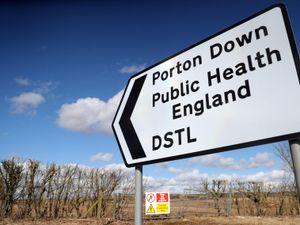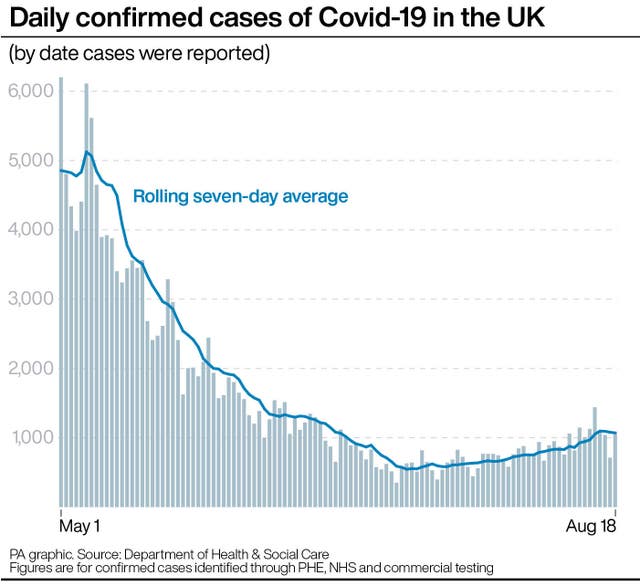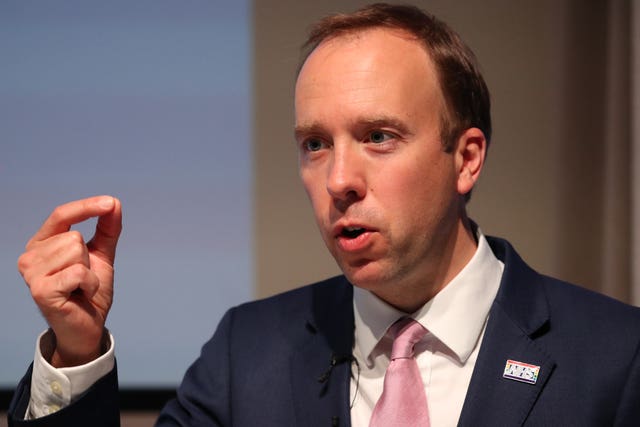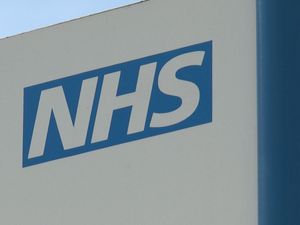Public Health England replaced with new body
Matt Hancock said there was ‘no time to lose’ as he launched the National Institute for Health Protection.

The Government is to press ahead with controversial plans to scrap Public Health England (PHE), the Health Secretary has announced.
Matt Hancock has launched the new National Institute for Health Protection, a new body which will respond to health threats including infectious diseases, pandemics and biologic weapons.
The new organisation, headed by Tory peer Dido Harding, will begin work immediately but will become formally operational next spring to reduce disruption during the pandemic, it was announced.
It will merge the Covid response work of PHE, NHS Test and Trace and the Joint Biosecurity Centre in the “first step towards becoming a single organisation”, the Department of Health and Social Care (DHSC) said.
The Government has faced criticism over the prospect of breaking up the PHE – which was established in 2013 under Conservative health reforms – in the middle of a pandemic.
Ministers have also been accused of using PHE as a “scapegoat” for other failings in the crisis.
And commentators have called into question the appointment of former TalkTalk boss Baroness Harding.

Speaking at the Policy Exchange think tank, Mr Hancock said: “To give ourselves the best chance of beating this virus and spotting and tackling other external health threats now and in the future, we need to bring together the science and the skill into one coherent whole.
“So, today, I am announcing that we are forming a new organisation, the National Institute for Health Protection.
“The National Institute for Health Protection will have a single and relentless mission: protecting people from external threats to this country’s health.
“External threats like biological weapons, pandemics and, of course, infectious diseases of all kinds.”
Mr Hancock said the new institute will play a role across the UK and be dedicated “to the investigation and prevention of infectious diseases and external health threats”.
He added: “It’s conceived amid crisis but it will help maintain vigilance for years to come.”

Mr Hancock said the system would learn from South Korea and Germany’s Robert Koch Institute, “where their health protection agencies have a huge primary focus on pandemic response”.
The Health Secretary added he had “every confidence” the new organisation would be “world-renowned” and there was “no time to lose” in setting it up.
But leading health think tank the King’s Fund said PHE “appears to have been found guilty without a trial”.
It is expected that a consultation will be launched about PHE’s other work.
The health body has a wide remit including driving down health inequalities and improving the nation’s health by tackling issues such as obesity and smoking.
PHE boss Duncan Selbie has been ousted as head of the organisation in the reshuffle, with Michael Brodie, head of the NHS Business Services Authority, appointed interim chief executive of PHE.
Mr Selbie, who is highly regarded in the public health community, is to become a senior adviser on global and public health to DHSC.
He said it had been an “honour and a privilege” to lead the organisation, adding: “I could not be any prouder of what PHE has achieved since 2013 in protecting the country from infectious diseases and environmental hazards and in improving the health of the people, from reduced smoking rates to tackling poor air quality and obesity and much else.”
Baroness Harding said: “The changes announced today are designed to strengthen our response, and to radically ramp up our fight against this disease, whilst also protecting PHE’s essential work beyond Covid that is so important for the nation’s health.”
Layla Moran, Liberal Democrat MP and chairwoman of the All Party Parliamentary Group on Coronavirus, said: “The lack of public scrutiny or transparent recruitment process for such a crucial appointment is appalling.
“This decision should have been debated and scrutinised in Parliament. Given we still don’t have an effective test, trace and isolate system, this feels like a reward for failure.”
Labour’s shadow public health minister Alex Norris said: “The structural reorganisation that Matt Hancock has announced today is a desperate attempt to shift the blame after years of cutting public health budgets, when the real shift we need is towards an effective local test and trace system that delivers mass testing and case finding.”
Richard Murray of the King’s Fund said: “PHE appears to have been found guilty without a trial. It is unclear what problem Government are hoping to solve by carving up PHE and redistributing its responsibilities.
“Undoubtedly, there are questions to be answered about England’s handling of the Covid-19 crisis, but the middle of a pandemic is not the time to dismantle England’s public health agency.”
Nigel Edwards, chief executive of the Nuffield Trust think tank, said: “The Government risks making a major misstep by dismantling its own public health agency at such a crucial time, creating a huge distraction for staff who should be dedicating themselves to the next stage of the pandemic.”
Professor Maggie Rae, president of the UK Faculty of Public Health, said: “Government needs to recognise the importance of all functions and domains of public health – not just health protection.”
Professor Patty Kostkova, director of University College London’s Centre for Digital Public Health in Emergency, tweeted: “In 2013, the Tories restructured the world-class scientifically independent Health Protection Agency and created underfunded Public Health England while cutting public health operation at local level.
“The decision to abolish PHE in the middle of the deadly Covid-19 pandemics without consultation while the UK Parliament is not sitting is scandalous. Setting up a new National Institute for Health Protection by a merge with dysfunctional private NHS Track and Trace operation under leadership of Dido Harding, who has no expertise in public health, seems yet another purely politically motivated move to shift blame for Government’s failures over handing of the Covid-19 crisis.”
Chris Hopson, chief executive of NHS Providers, said: “As a nation we’ve failed to properly prioritise or fund public health in recent years and that came back to bite us hard as Covid-19 hit.”
He welcomed the interim appointments of Baroness Harding and Mr Brodie but added: “It is important that any permanent appointments go through due and proper process which will include taking full and proper account of party political affiliations.”
Dr Jeanelle de Gruchy, president of the Association of Directors of Public Health, said: “The timing of this announcement risks distracting efforts and throws roles, functions and leadership into uncertainty.”
In other developments:
– Leicester’s local lockdown will be partially eased to allow some businesses to reopen.
– The number of British adults suffering depression has almost doubled compared to before the pandemic, according to the Office for National Statistics (ONS).
– Data from official agencies across Britain show that over 57,000 deaths involving Covid-19 have now been registered in the UK.
– A separate ONS data series showed that only around 28% of people testing positive for Covid-19 reported any evidence of symptoms at the time of their swab test or at either the preceding or subsequent tests.





